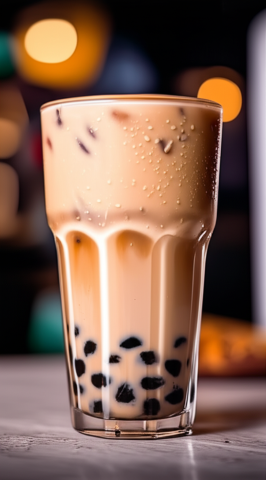
Boba Tea - Fact or Foe?
Boba tea, also known as bubble tea, pearl milk tea, or tapioca tea, has taken the world by storm. This delightful beverage, with its chewy tapioca pearls and customizable flavors, has become a global phenomenon. But is it all hype, or is there substance behind the sweetness? Let's delve into the facts and explore whether boba tea deserves its place in our hearts (and stomachs).
The Allure of Boba: What Makes it so Popular?
The appeal of boba tea is multifaceted. First and foremost, it's incredibly customizable. The base can be tea (ranging from black and green to oolong and fruit teas), milk (dairy or non-dairy), or even yogurt. Then, there's the choice of flavors – from classic taro and mango to more adventurous options like matcha, brown sugar, and even cheese foam. Finally, the signature tapioca pearls add a unique textural element that's both fun and satisfying to chew.
Beyond the taste and texture, boba tea offers a social experience. It's often enjoyed with friends, making it a perfect accompaniment to gatherings and social outings. The vibrant colors and aesthetically pleasing presentation also contribute to its appeal, making it a popular subject for Instagram and other social media platforms.
The Nutritional Landscape: A Closer Look
This is where things get a bit more complicated. While boba tea can be a relatively harmless treat in moderation, the nutritional profile varies wildly depending on the ingredients and customization choices. A small, less-sweetened version with a plant-based milk might offer a modest source of antioxidants from the tea itself. However, many variations are loaded with sugar, calories, and artificial flavors.
The tapioca pearls, while fun to chew, are primarily carbohydrates and offer little nutritional value. Larger servings and sweeter flavors can quickly translate into a significant calorie and sugar intake, potentially contributing to weight gain and other health concerns associated with high sugar consumption.
Moreover, the high sugar content can also impact dental health. The sticky tapioca pearls can further exacerbate the problem, trapping sugary residues around the teeth. Regular consumption of boba tea, especially without proper dental hygiene, could increase the risk of cavities and gum disease.
Health Concerns and Considerations
Beyond sugar and calories, there are other health concerns to consider. Some boba tea shops may use lower-quality ingredients or improper hygiene practices, leading to potential foodborne illnesses. Individuals with lactose intolerance need to be mindful of dairy-based options, while others may have allergies to specific ingredients or flavorings.
The large size of many boba tea servings can also lead to overconsumption of calories and liquids, potentially contributing to bloating and digestive discomfort. Excessive consumption of sugary drinks is linked to various health problems, including type 2 diabetes, heart disease, and certain types of cancer.
Moderation is Key: Enjoying Boba Responsibly
The key to enjoying boba tea without compromising health is moderation. Opting for smaller sizes, choosing less sweet options, and selecting healthier bases like unsweetened teas and non-dairy milks can significantly reduce the negative impact on your health. Furthermore, paying attention to ingredient lists and choosing reputable establishments can mitigate risks associated with food safety and quality.
Consider making boba tea an occasional treat rather than a regular part of your daily diet. Balance it with a healthy diet rich in fruits, vegetables, and whole grains. Staying hydrated with water and other healthy beverages is also crucial.
The Verdict: Friend or Foe?
Boba tea isn't inherently "good" or "bad." It's a beverage that, like many others, can be part of a healthy diet when consumed in moderation and with mindful choices. The decision of whether it's a "friend" or a "foe" depends entirely on individual consumption habits and overall dietary patterns.
If you choose to enjoy boba tea, make informed decisions. Look for options with lower sugar content, healthier milk alternatives, and high-quality ingredients. Pay attention to portion sizes, and remember that balance is key. Treat boba as a delightful occasional treat, not a daily staple, and prioritize overall dietary health.
Beyond the Hype: Exploring Alternatives
For those seeking a refreshing and flavorful beverage without the potential downsides of boba tea, numerous healthy alternatives exist. Homemade fruit-infused water, unsweetened iced tea, smoothies with real fruit, and even sparkling water with a squeeze of citrus can provide similar refreshment without the added sugars and calories.
Experimenting with different homemade tea variations allows for greater control over ingredients and sweetness levels, ensuring a healthier and more personalized beverage experience. This not only promotes better health but also reduces reliance on potentially less-healthy commercial options.
Conclusion: A Balanced Approach
Boba tea's popularity is undeniable, fueled by its customizable nature and delightful taste. However, a balanced approach is crucial. By making informed choices, practicing moderation, and being mindful of its nutritional impact, boba tea can be enjoyed as an occasional indulgence without significantly impacting overall health. Ultimately, the decision of whether boba tea is a friend or foe rests on individual responsibility and conscious consumption habits. Remember to prioritize overall well-being and balance your treat choices with a healthy lifestyle.
No comments:
Post a Comment